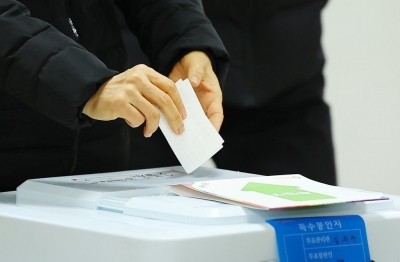Seoul, March 9 : South Koreans voted on Wednesday to pick a new president after a tightly contested race between ruling party candidate Lee Jae-myung promising improved livelihoods and his main opposition rival Yoon Suk-yeol championing a fairer society.
Two hours after the polls opened at 6 a.m., election officials reported an average voter turnout of 5 per cent nationwide, slightly lower than the 5.6 per cent reported at the same time in the previous presidential election in 2017, Yonhap news agency reported.
Voter interest is unprecedentedly keen in this year’s election as seen in the record turnout in last week’s early voting.More than 16 million, or 36.93 per cent, of a total of some 44 million registered voters already cast their ballots in early voting Friday and Saturday.
The turnout marked the highest since the early voting system was introduced in 2014.Election officials will add the number to Wednesday’s turnout to report overall voter turnout starting at 1 p.m.
The election also takes place at a time when South Korea has seen Covid-19 cases exploding in recent weeks.
Amid concern about depriving the voting rights of hundreds of thousands of virus patients, the government has allowed them to leave quarantine to vote, but a lack of preparations led to blunders during early voting, such as collecting votes of virus patients in plastic bags and other containers, rather than ballot boxes.
In Wednesday’s election, virus patients and those in quarantine are allowed to vote from 6 p.m.to 7:30 p.m.after regular voting closes.The National Election Commission has also revised regulations to allow them to put their votes directly into ballot boxes.
The race has been markedly close between Lee of the ruling Democratic Party and Yoon of the main opposition People Power Party.
Surveys conducted before the blackout on all nationwide polls last week showed the two running neck and neck within the margin of error.
Lee, 57, a former Gyeonggi Province governor, used his background in public administration to campaign under the slogan of a competent and pragmatic president who will get things done in both the economy and foreign relations.
Yoon, 61, a former prosecutor general, rode a wave of public anger at the administration of outgoing President Moon Jae-in and his ruling party to seize on a message of fairness, common sense, principle and the rule of law.
A potential tiebreaker between the two arrived last Thursday, when the third-placed candidate, Ahn Cheol-soo of the minor opposition People’s Party, dropped out of the race to support Yoon.Ahn had had about 10 percent support before his withdrawal.
The impact of that coalition is difficult to gauge because of the blackout on polls.
Many believe the coalition has boosted Yoon’s chances, but some others warn it could backfire and result in motivating more Lee supporters to vote.
Vote counting is expected to begin across the nation as soon as the polls close, and a winner could emerge several hours later if the counting goes smoothly, though the final tally won’t be completed until early Thursday.
The results could have profound impacts on the direction South Korea will take on key issues, as Lee and Yoon differ on foreign policy, including relations with North Korea, and economic issues, such as welfare and real estate policies.
This year’s election was seen by many as the country’s worst election because of the high degree of negative campaigning on all sides.
The public’s aversion to the candidates ran so high the race came to be known as the “unlikeable election,” creating an unusually large number of swing voters, who postponed their choices until the last minute.
On the one hand, Lee was suspected of involvement in a massive corruption case behind the 2015 development of an apartment complex in Seongnam, south of Seoul, during his time as the city’s mayor.
His wife, Kim Hye-kyung, was accused of misusing public servants and government credit cards when Lee was governor of Gyeonggi Province.
On the other hand, Yoon faced allegations he associated closely with shamans and relied on them for advice.
His biggest liability during the campaign was arguably his wife, Kim Keon-hee, who was accused of accepting bribes and manipulating stocks long before he launched his presidential bid.
Late last year, she came under attack for allegedly lying on her resume while applying for jobs at two universities in 2007 and 2013.
int/shs
#SKoreans #StockExchange #SenSex #Nifty #India #Economy #Seoul #Democratic Party #Democratic #Covid-19
.






